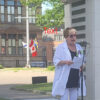
KJIPUKTUK (Halifax) – Premier Rankin announced in a May 19 press conference that students would not be returning to classrooms until September, marking a shift to virtual learning for the remainder of the school year.
Nine days later, on May 28, the government reversed their decision, calling for schools to reopen with only five days notice. Initially, schools in Halifax and Sydney were excluded and to remain closed due to continued community spread.
At 5 p.m. on May 31, the government backpedaled their back to school plan even further, announcing classes in Halifax and Sydney would open on June 3, “based on advice from public health about the province’s improving epidemiology.”
Derek Mombourquette, who was appointed Minister of Education when Iain Rankin became premier, told the Nova Scotia Advocate that the department gave teachers ample notice regarding the return to schools for three weeks.
“We actually did inform the union of the change before we made it,” he said. “We’ve always had an open conversation with President Wozney about the school system,” adding, “the communication has always been there.”
Wozney, teachers, and news reports alike refute this courtesy call. When pressed about the amount of advance notice teachers received of going back to school, Mombourquette responded, “I don’t have the exact time.”
“That was a snap decision, you know, made without consultation, no conversation at all. That was a real blindside from our perspective,” Wozney said when we asked him to reply, calling it a “real misfire.”
“Dr. Strang and Premier Rankin didn’t do their due diligence,” Wozney said.
Teacher nearly ‘passed out’ teaching in heatwave
Less than a week into in-school learning, a record-breaking heat wave loomed over the province, creating unsafe conditions for children and teachers alike. Additionally, at least five schools have reported COVID exposures in the week since reopening.
Air ventilation and circulation systems are turned off at the end of the day and only turned back on at 7 a.m. of a school day, making buildings like a greenhouse for staff and students alike.
The teacher I spoke with last June painted a picture of confusion, inconsistent protocols, and unsafe learning conditions.
“Every single class that I had that first day back I had students asking, ‘So if we have to be so careful, why are we back, because it’s not safer than it was before,’” they said, adding that “teachers are always left with these really difficult questions.”
“They had to be facing forward with masks on, not touching or talking to anyone face-to-face in the classroom,” the teacher explained. “But then when they go to phys-ed, they can take their masks off so they’re not huffing and puffing. They’re running around sharing balls and that is somehow okay, but ten minutes later, it’s time for science class where they can’t share pencils. They’re teenagers, they’re not dumb.”
The teacher says excessive heat and humidity create unsafe conditions for the classroom. The teacher said that schools are not providing fans.
“If we want a fan for a classroom, you have to go buy a fan.”
After three days of teaching in extreme conditions, the teacher “thought [she] was going to pass out,” in the middle of teaching a class.
“Several staff members at my school have been contacting the board and the department asking like, what is your policy in terms of temperature cut off for sending kids [to school], because I know usually they have a number with the windchill,” the teacher said. No response has been issued.
Wozney allowed his children to work from home during the heatwave, considering the windows in their classrooms cannot be opened without interfering with the air ventilation systems.
Even hydrating students can be a challenge. Many schools in Nova Scotia do not have safe drinking water. Additionally, the returns of rented water supply equipment and emptying of inventory in cafeterias further limits students’ access to drinking water.
“I think this really points to the fact that we’re gonna have to wrestle with climate issues,” Wozney warned. “We’re going to have to start to wrestle how schools are set up to handle or not handle those temperatures and keep kids safe, and how we’re going to respond to that.”
The last two years not ‘a waste’ for students
The teacher says the announcement to return to school in June was news to teachers across the province, despite the minister’s claim that teachers were notified. This has been the norm, the teacher claims.
In one instance, the teacher says their administrator received an update on teaching conditions from the department “by accident”. “She was told to erase it so she couldn’t share.”
“The government made its official announcement that we were out for the year so people, teachers, students, families, everybody started to plan accordingly,” they said.
The teacher moved three hours away from their school, believing the distance would have no impact on virtual learning.
“We were also told to take all of our belongings, all of our personal items until that September [2021].” With most of their teaching material in storage, the teacher gutted the remainder of the classroom in May, taking every stapler and holepunch, under the impression students wouldn’t be back until the fall.
Despite the added struggles, the teacher doesn’t believe we can call the last two years a ‘waste’ for children’s education.
“It really frustrates me when I see people say, you know, kids at home are doing nothing for the past month,” the teacher said. “I worked very hard in front of my computer for hours every day trying to make things engaging, getting work in and getting feedback to students, working hours outside of what I really should have.”
Education minister says students are ‘doing very well’

When asked about whether all students will advance to the next grade due to the unpredictable and inconsistent pandemic learning, Mombourquette only noted that early results show students “doing very well.”
“We’ve always said the best place for our students to be in class,” Mombourquette said, claiming “we’ve never had spread of COVID within [a] school.”
He noted a digital survey filled out by 26,000 parents helped inform the department’s decision-making this year.
Wozney disagrees.
“The families that are going to respond to a digital survey are the families that can afford an internet connection and a device, and have disposable time to sit down and be able to fill that survey out. And given the families who were parents and guardians are working two jobs at the same time, they really make choices between a cell phone and an internet connection,” Wozney said.
“These are the families that I would argue we most need to hear from in terms of what the system needs are and these are the people we are least likely to get a response from.”
Wozney says teachers are an afterthought and calls discussions with the provincial government “like talking to a brick wall.”
“There remains a lot of room for government to adopt a collaborative approach that actually yields the results that families are looking for and the teachers want to be able to deliver,” he said. “It’s hard to work in a system where policy and funding and models all are handcuffed to doing the right thing for the things that you care about and show for every day.”
“We’re not quite sure whether or not this government intends to operate differently than its predecessor,” Wozney warned.
See also: To create a better work environment after COVID-19, we must truly hear employees
Check out our new community calendar!
With a special thanks to our generous donors who make publication of the Nova Scotia Advocate possible.
Subscribe to the Nova Scotia Advocate weekly digest and never miss an article again. It’s free!




“Many schools in Nova Scotia do not have safe drinking water. Additionally, the returns of rented water supply equipment and emptying of inventory in cafeterias further limits students’ access to drinking water. ” This is not acceptable at any pubic institution in Canada.
The circumstances here speak to the need for a clear understanding of the rights, roles, responsibilities, and expectations for each of the partners in education (student, parent, staff, government, and community). With the loss of English-language school boards, COVID responses, and ongoing reform initiatives, the public education system has become a centralized, top-down bureaucracy, where communication has been weakened, trust is eroded, and accountability is lost. We need a new approach, and I think that could be done through a Student-Parent Charter.
Kendall Worth here;
When I saw the Sentence in this article that said:
“Wozney says teachers are an afterthought and calls discussions with the provincial government “like talking to a brick wall.” ”
What came to my mind was “Talking to anyone anywhere in Government is just like talking to Brick Wall”
It certainially does not surprise that teachers are having this Experience with Government. Anytime they reopened schools since
September made me glade I do not have kids of my own. If I did have kids of my own mine would not have gone back anytime since they re-opened schools since September. I believe more parents should have kept thier kids especially when COVID Cases were high plus during the heat wave. I think Online learning should have made avaible for parents who did not feel comfortable sending their kids back.
These kids had no choice all year (expect when schools actually were closed) but to go to school putting others at risk. Others meaning putting thier Teachers, Principal, staff and for those who take school buses to and from school thier bus drivers, Ect at risk of catching COVID. and I go agree the recent heat wave was no help either.
I think the kids going back to school has been great for the kids. This is a normal month pre covid for them to be in school. So why people are complaining about hear is confusing? There’s been a heat wave in March in previous years, I don’t find any articles of teachers complaining about teaching! Yes it was hot for TWO days. Nova Scotia is known for more rain then heat. I think people need to calm down. If you don’t want to go out in the heat then stay home and keep your kids home. Simple.
Previous heat waves didn’t happen during a pandemic where proper ventilation is crucial, meaning, as stated in the article, “the windows in their classrooms cannot be opened without interfering with the air ventilation systems”. Also “The teacher said that schools are not providing fans.” Imagine sitting inside, with the windows closed, with no fan, while it’s 37 degrees outside.
The benefits of going back to school for little ones is immeasurable all round – what a blessing to be off-line and end the year on such positive notes – making memories like this cannot be understated. 🙂